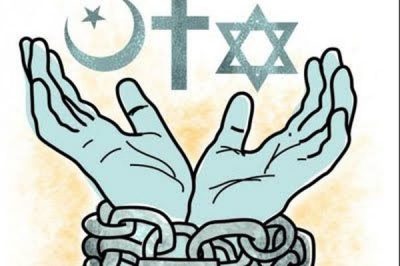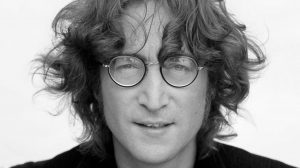A Religion-Free Society?

“I cannot believe in a God who wants to be praised all the time.” — Friedrich Nietzsche
“Religion is like a pair of shoes…..Find one that fits for you, but don’t make me wear your shoes.” — George Carlin
“I believe in God, but not as one thing, not as an old man in the sky. I believe that what people call God is something in all of us. I believe that what Jesus and Mohammed and Buddha and all the rest said was right. It’s just that the translations have gone wrong.” — John Lennon
“Religion is the opium of the people.” — Karl Marx
“Science not only purifies the religious impulse of the dross of its anthropomorphism but also contributes to a religious spiritualization of our understanding of life.” — Albert Einstein
“All real art is, in its true sense, religious; it is a religious impulse; there is no such thing as a non-religious subject. But much bad or downright sacrilegious art depicts so-called religious subjects.” — Madeleine L’Engle
***
Is there really a need for religion(s) in the 21st century? If there is, why? Isn’t it that religions have always been with us since time immemorial and we take their existence as something normal? Without getting into a hasty generalization, isn’t it that every individual person who has a religion was actually born into it (of course, except those converts in their adult life)? In this sense, we should not be talking about the need for religion(s). Religion seems to be a spontaneous event as if it just comes naturally, i.e., without any resistance at all on the part of someone entering into it. The initiation is so unconstrained that it is even construed as a celebration.
Or having this kind of notion is just a rehearsal of a classic understanding of what religion is. In that case, such classic treatment is nothing but a romanticizing of its past glory that no longer makes sense from the perspective of modern humanity. In this connection, we could assume that there has been a rocky path in our journey through historic time where religion has encountered strong resistance like a sailboat struggling to keep afloat amidst the onslaught of giant waves in a stormy sea. Perhaps religion has been under attack from adversaries who have been sick and tired of its lofty promises that don’t match up with paramount reality. Perhaps religion has already reached its limits that it can no longer cope with the tall order of science. In other words, religion has already failed – and failed miserably – to satisfy certain inquiries emanating from the inquisitive mind of the modern person. Perhaps we should be considering right now the possibility of a religion-free society.
Thinking of a religion-free society automatically reminds me of John Lennon’s immortal “Imagine” where one stanza says:
Imagine there’s no countries
It isn’t hard to do
Nothing to kill or die for
And no religion, too.
Very idealistic indeed. Though I wouldn’t venture to opine at this point that such is an impossibility. Neither David Hume would, had he been around armed with his theory of causality which distinguishes constant conjunction from necessary connection. In the realm of necessary connections – the technical field of logical analysis – impossibility is reckoned only in contradictory expressions, propositions and arguments. While in the realm of constant conjunctions – the world of human experiences – anything conceivable, i.e., imaginable, in the mental space that doesn’t violate its logical configuration is possible to be or to be made to exist in reality. Within the context of this Humean theoretical platform, it is not impossible under normal circumstances to conceive in one’s mind the being of a society where there is no religion at all.
But before proceeding further in the present discussion, let it be made clear that I am using the term “religion” in its basic sociological sense as an institutional organization of faithful believers holding a set of doctrinal beliefs – virtues and values – and dogmas (or so-called “eternal principles”) as well as practising certain established rituals and observing fixed holy days (or holidays, if you will) of solemn importance, among other salient components exclusive to the organization’s systemic structure. Apparently, the meaning of religion, in this scope and limits, doesn’t include personal religion which particularly depends on the faith-experience or spiritual beliefs of an individual person which is a matter of subjective conviction. In other words, religion in the present context may not totally equate with individual spirituality. However, a deeper consideration of which could be of fundamental significance if viewed from the perspective that institutional religion basically emanates from such kind of individual subjective spirituality.
In a world beset with all types of problems big and small, simple and complex, despite the progress generated by science and technology by leaps and bounds, there are moments when we find ourselves alone even amidst a crowd gathered around us that doesn’t know, much less care, about our sufferings. We are in the company of colleagues, acquaintances, and friends but we are all alone in the unspoken pains that continue to linger in our hearts. And we look for inspiration and insight to brighten, freshen and uplift the spirit in us. In the words of the German philosophical theologian, Paul Tillich, we are set to discover the existential significance of an “ultimate reality” to make our lives worth living. This is the factor that connects and identifies with the religious impulse or the impulse of the spirit in us.
There seems to be a natural religious impulse within the mental constitution of every human being that is endowed with a consciousness capable to be aware not only of the phenomena of external realities but likewise of its own consciousness. Under normal circumstances, this urge is present in every human endeavor to make one’s life liveable. It doesn’t have to be called “religious” or something associated with the common understanding of religion. But the seminal principle of practically all established religions in the world emanated from this impulse. It could even be understood as the one single integrant of human existence that spontaneously gathers individual persons together to satisfy the inherent longing to belong and be associated with each other in achieving common goals from day to day as we share the same horizon not only in the here and now but more significantly in the future.
Self-reflectiveness spontaneously draws the human individual to a realization of both her/his outer and inner strengths and limitations in a universe whose mysteries s/he seemingly can never comprehensively fathom and ultimately master even in several lifetimes. In this situation of givenness, s/he is not alone; the entire humanity is with her/him as s/he is, in reality, a part of that humanity. And in a myriad of pockets of humanity, like-minded individuals are drawn together and find themselves amazingly sharing similar ideals, wishes and hopes from the most microcosmic to the most macrocosmic levels of existence. From this point onward lies the trajectory that leads to consolidation where similar religious impulses that now converge as a unified form of higher spirituality evolves into a formidable institutional power called religion.
Along this line of thought, this impulse of the spirit, if you will, has perennially been present in every age and generation. And as we connect it with the basic notion of religion that doesn’t necessarily have anything to do with our concept of organized and institutionalized religion as we know them all around the neighborhood, it is the factor that also seeks and desires for a gathering in a community of likeminded individuals. The issue of belief and faith is out of the question at the earliest point of encounter. What really matters most importantly is the community itself–something that is lacking in a typical modern western society of thousands of beaten paths reflective of the separate ways people take as they pursue their individualistic, even egotistical, way of life.
This trend has always been present since time immemorial in successive generations of practically all social formations on planet Earth. In this connection, it seems like thinking and imagining a religion-free society is by and large just a fanciful musing of idle dreamers who’d rather choose to be left alone in their schizophrenic fantasies. So that despite the robust efforts of the so-called freethinkers of modern or post-modern category to stamp out religions from the face of the Earth, the whole commitment is an exercise in futility and the more these freethinkers unite and push their agenda further as they organize into united fronts, the more it becomes obvious that they in the process are unwittingly on the way to the formation of a new kind of religion. With this in mind, what we could imagine at this point is the emergence of a religion that may not have the trappings of the old traditional ones but still an institutional organization whose members hold a set of non-negotiable beliefs and non-compromisable principles as well as practising certain ceremonies and observances of paramount importance, among other practices exclusive to the organization’s systemic structure.
Perhaps, the most realistic thing we could dare say at this juncture of humanity’s cultural evolution is the fading away of certain religious beliefs of ancient vintage that have been overwhelmingly subdued and swept away by science into the dustbin of impracticability and irrelevance. But in the light of the principle of evolution that has continually been operating in the world, religion will simply go through the process of mutation and transmutation depending on how it satisfies the physical, mental and spiritual longings of humanity.
In conclusion, we can say with a modicum of reasonable certainty that the need for religion(s) is commonplace in all ages and thus in the 21st century. Religion in all forms and shapes, colors and hues is here to stay. It may assume a new configuration, both internal and external, but it will always be around as a fitting manifestation of an impulse inherent in humanity whether it is theistic or atheistic, pantheistic or panentheistic. What truly matters is the instinctive inclination and urge of normal like-minded people to gather together in a sharing community. Believing in a supreme being or not is not the key point; it is the feeling of belongingness. And this we have witnessed in the invention of new religions and the reinvention of traditional ones as well. In the final analysis, a society that is free from religion will remain to be an unachievable ideal of romantics undyingly enthralled by John Lennon’s poetry.
*
Note to readers: please click the share buttons above or below. Forward this article to your email lists. Crosspost on your blog site, internet forums. etc.
Prof. Ruel F. Pepa is a Filipino philosopher based in Madrid, Spain. A retired academic (Associate Professor IV), he taught Philosophy and Social Sciences for more than fifteen years at Trinity University of Asia, an Anglican university in the Philippines.
Featured image is from Muslim Mirror


